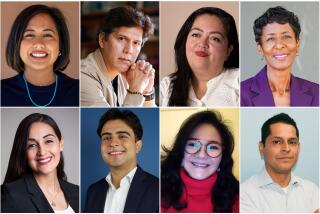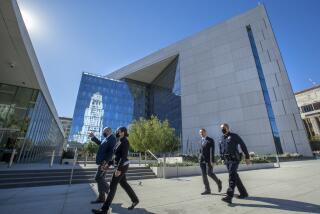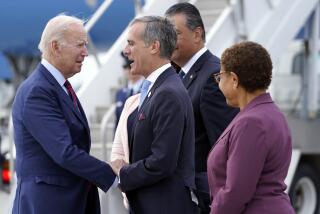Garcetti May Be Losing Grip on Top Job
After more than two months of controversy surrounding a star-crossed move to ease term limits for his colleagues, Los Angeles City Council President Eric Garcetti said he has heard talk that he may be ousted from the top post.
Though he believes it is just idle chatter, it is an odd spot for Garcetti. He has held the post for almost nine months, shaping the makeup of committees and acting as the city’s second-in-command to Mayor Antonio Villaraigosa.
Although he entered the job as a policy wonk pledging to focus on issues and advocate for clean government, Garcetti has had to spend much of his time trying to please the colleagues who unanimously elected him -- and who with eight of 15 votes can take the presidency away.
Most recently, a ballot measure pushed by Garcetti to allow council members to serve more time in office ran afoul of a Los Angeles County Superior Court judge who declared it unconstitutional. The city, at Garcetti’s urging, appealed the decision, and the measure remains on the Nov. 7 ballot pending a court date next month.
But privately, some council members believe it won’t pass and blame Garcetti for mishandling the issue.
Even some of Garcetti’s longtime supporters in his district are unhappy. “I still think that Eric is a good council member, but I’m troubled by a lot of the things that have happened during his council presidency,” said Jason Lyon, a member of the Silver Lake Neighborhood Council. “I also think he has trampled on his own ideals at times.”
In an interview last week, Garcetti said he feels he is on strong footing.
“I live my life moving forward and not listening to the armchair prognosticators,” Garcetti said. “I feel like we’re taking care of the public’s business, and it’s a place where the old fights between council members aren’t happening. It’s not something that makes headlines when people get along.”
The main job of the president is to run meetings and make committee assignments. Garcetti came into the post wanting to make something more of it and to fashion a broad citywide vision for the council, whose members usually tend first to their specific districts.
It has proved to be a difficult task. L.A.’s council members have long been known as mini-mayors because of the size of their districts, which have populations larger than most American cities. Complicating matters, the council president is also the public face of the body, for better or worse.
In the summer, for example, five members got into a public spat with Los Angeles Police Chief William J. Bratton after he declared that Councilmen Bernard C. Parks and Dennis Zine “don’t know what the hell they are talking about” when they were critical of the department’s hiring policy.
The five council members wanted Bratton investigated for making what they called unprofessional and unnecessary statements. Although the request was widely mocked at City Hall as an extension of a grudge held by Parks, whom Bratton replaced as chief, Garcetti vociferously defended his colleagues and demanded an apology from Bratton -- an apology that still hasn’t come.
More recently, Garcetti has been bedeviled by the effort to give council members the ability to seek three terms instead of just two. Although he frequently talks about his desire to make government more transparent, that did not seem to apply to the term limits proposal coveted by his colleagues -- with seven of them due to be forced from office in 2009 and five more in 2011, assuming they are reelected next year.
When the ballot measure was set to be debated by the city Ethics Commission shortly before final council approval, commission President Gil Garcetti -- the councilman’s father -- was unable to attend. As a result, there was no meeting. That was widely seen at City Hall as the father giving political cover to the son.
Earlier this month, Superior Court Judge Robert H. O’Brien said the measure illegally combined the term limits proposal with another placing restrictions on lobbyists -- an element added by proponents to make easing term limits more attractive to voters.
Referring to the council’s performance on the issue and not Garcetti specifically, city Controller Laura Chick said: “I think that the best way to interpret what has happened is that some elected officials really lose touch with the public they represent and make the mistake that the public isn’t as observant and intelligent as it really is.”
Garcetti’s hold on the presidency could also turn on the strength of his relationship with Villaraigosa and whether the mayor would intercede on his behalf if a challenge came.
Villaraigosa supported Garcetti last year when Garcetti ousted then-President Alex Padilla. Although publicly the two appear to be on good terms, Garcetti and Villaraigosa didn’t agree on putting a $1-billion affordable housing bond on the ballot; the mayor worried that the timing wasn’t right to ensure passage.
More important, officials in the mayor’s office were not pleased that Garcetti didn’t do more to corral support when the council voted on Villaraigosa’s plan to get control over the school district -- the mayor’s most coveted legislation -- even though it eventually passed unanimously.
And, last week, Garcetti voted against settling a lawsuit brought by the American Civil Liberties Union against the city’s sidewalk sleeping law -- a tool the council wants in its efforts to clean up skid row.
These maneuverings and votes by Garcetti suggest that he is willing to vote his own way. The question is whether being somewhat independent from Villaraigosa will cost him politically.
And that has led to this kind of speculation: Villaraigosa is close to Councilman Herb Wesson, a former Assembly speaker who has been asked about his interest in the presidency since joining the council last year. Like most council members, Wesson wants to see term limits eased. For one, it would make him eligible to serve until 2019 and give him job security. Or, if he runs for county supervisor in 2008 to replace his old boss, Yvonne Brathwaite Burke, having extra time on the council could keep two potential opponents for that job -- Parks and Councilwoman Jan Perry -- on the sidelines.
Thus far, Wesson has publicly praised Garcetti. But he also raised antennae in City Hall recently when he said this to The Times about Garcetti: “I voted for him yesterday and I’d vote for him today.” He didn’t say anything about tomorrow.
Wesson is 54 and Villaraigosa 53. Unlike Garcetti, who is 35, they are men who did not excel in school but are known as street-smart, savvy politicians. As Assembly speakers, both came to believe in a controlling style of governance.
Publicly there is no indication of a fracture in Garcetti’s and Villaraigosa’s relationship. But it also doesn’t seem implausible for the mayor to someday support Wesson.
Garcetti defends his track record and believes he is situated politically to survive in the job.
“I can bring something of value to the mayor -- and that’s five years of relationships and conversations with people who haven’t necessarily been the closest of allies with him but want to be part of a citywide team,” Garcetti said. “Whenever you’re moving in politics, you’re defined by velocity, and it’s a fast game. You’re never going to be perfect.”
More to Read
Sign up for Essential California
The most important California stories and recommendations in your inbox every morning.
You may occasionally receive promotional content from the Los Angeles Times.










